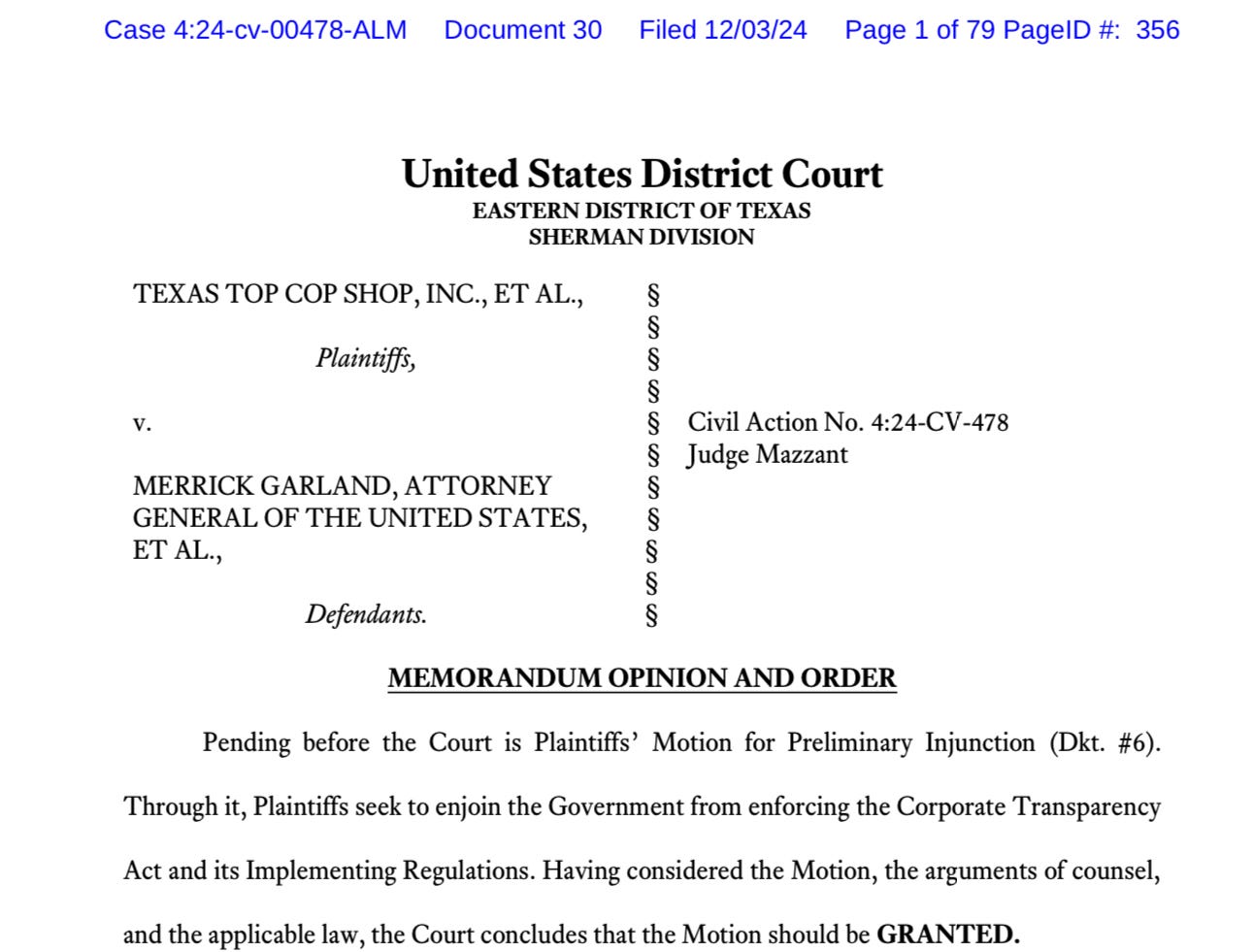The FIRST law Elon Musk and DOGE should ask Donald Trump to dump
In 2021, in a huge, onerous expansion of the surveillance state, Congress largely banned anonymous corporate ownership. A federal judge has already ruled the law unconstitutional. It needs to go.
“New BOI Reporting Requirement”
Recently, my accountant sent me an email with that mysterious subject line.
Notes that include the word “requirement” are rarely pleasant. I gritted my teeth, opened it, and found this:
We wanted to ensure you are aware of the new Beneficial Ownership Information (BOI) reporting requirements under the Corporate Transparency Act (CTA). Based on our records, we believe you may need to submit a BOI report for a company in which you hold a beneficial ownership interest…
Filing deadline: January 1, 2025…
Failure to comply may result in fines of up to $591 a day…
—
(I say I’m self-employed, but really I work for you. Shoveling truth for less than 20 cents a day.)
—
Fines of $591 a day? You have my attention.
I wondered if I’d gotten a weird spoof email, a hacking attempt, USPS has failed to deliver package, sign up checking account to receive important business information or American States attorney will persecute you…
Nope.
The Corporate Transparency Act turns out to be all too real, a federally mandated fishing (or should that be phishing?) expedition that marks yet another massive and apparently unconstitutional expansion of the administrative state.
Passed in 2021 to “curb illicit finance,” the act “requires many companies doing business in the United States to report information about the individuals who ultimately own or control them.” Not my words, the Treasury Department’s.
—
I ran afoul of this law because, like lots of self-employed people, I have my own business. It’s registered in New York state. Corporate registrations, like other ordinary police powers, are supposed to belong to the states in the American system.
But, in a (possibly) well-intentioned effort to curb money laundering, tax fraud, and other financial crimes, Congress and the Biden Administration decided practically every company in the United States should have to disclose its owners and controlling partners to the federal government.
This is not a trivial requirement. As the United States Chamber of Commerce explains:
[B]usiness owners may be surprised by some requirements for updated filings. For instance, if a beneficial owner changes their address, legally changes their name due to marriage or divorce, or obtains a new driver's license, it may necessitate an update to a company’s BOI report. Operational changes or a new delegation of authority could also qualify.
—
No surprise, numerous lawsuits challenging the constitutionality of the Corporate Transparency Act have been filed. And on Dec. 3, federal Judge Amos L. Mazzant III of the Eastern District of Texas issued a tightly argued 79-page ruling barring its requirements from taking effect anywhere in the United States on Jan. 1.1
Mazzant noted that nationwide preliminary injunctions like the one he issued are rare and face a high bar.
He found that this one was justified because neither the Commerce Clause nor any other part of the Constitution gives the federal government the right to demand the information it seeks. As Mazzant wrote, the law:
[R]epresents a Federal attempt to monitor companies created under state law—a matter our federalist system has left almost exclusively to the several States… [and] ends a feature of corporate formation as designed by various States—anonymity…
The Commerce Clause does not furnish Congress with police power or a “general license to regulate an individual from cradle to grave, simply because he will predictably engage in particular transactions.”
—
(The Constitution, battered but still undefeated after 236 years!)
—
Mazzant similarly demolished the government’s other arguments.
Put another way:
We already have a mechanism to make companies reveal their owners to local and federal law enforcement authorities when those authorities suspect crimes or civil malfeasance.
It’s called a warrant.
I understand. So much easier just to have the information at hand. Warrants are a pain, judges ask questions about them, there’s the whole probable cause thing, they can slow the mighty sword of justice.
That’s why we have them.
—
(Fighting for the First Amendment. And the other ones too. With your help.)
—
For now, Mazzant’s injunction remains in place. Neither I nor tens of millions of other people need to give the Treasury Department private information about our businesses.
But inevitably, the Biden Administration has told the Fifth Circuit Court of Appeals, which includes Mazzant’s court, that it plans to appeal the ruling.
Enough.
As Donald Trump - with Elon Musk’s help - seeks to shrink government and reduce its burdens on citizens and businesses, this may be the easiest decision that he has. He doesn’t have to fire anyone or even repeal the law immediately, he can just drop the appeal on January 20th and leave Mazzant’s injunction in place.
Business owners will thank him. More importantly, he’ll have stood up against the Washington mandarins who are certain they know best and see the Constitution as nothing but an obstacle to their brilliance. If we’d just give them a little more power, everything would be fine.
I know a little something about that. (More on Berenson v Biden coming soon…)
On Dec. 5, Mazzant issued an amended order, which was one page longer but not substantively changed.





So true. This is a terrible over reach. On the same level as vax mandates perhaps. The Biden administration continues to trash our rights so blatantly. At least Obama was subtle about it
Wow. Learn something new every day. I'm self-employed, but never created an official business as I employ no one and when I started writing in the state of California, my accountant said it would cost more to be an LLC or incorporate than to just remain a sole proprietor. Why would the government need this information? Answer: they don't.